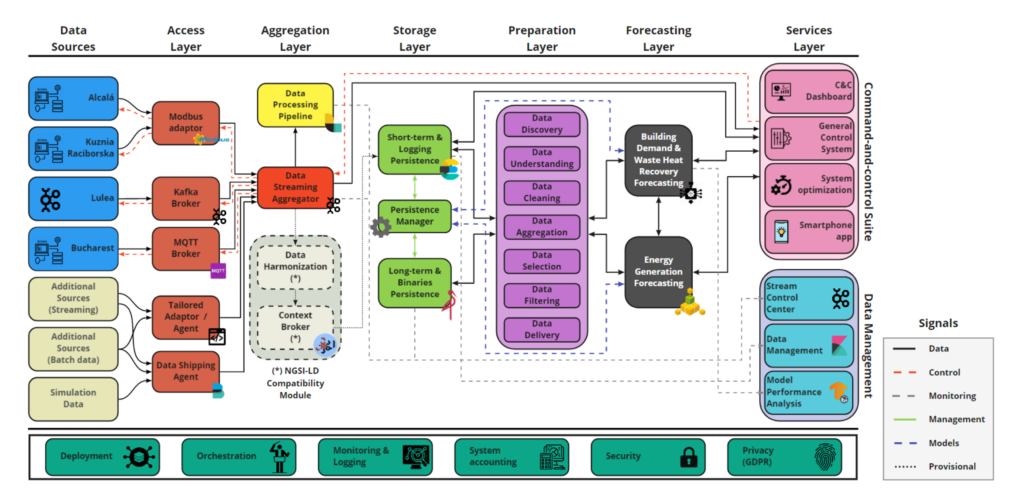WEDISTRICT will design and develop an Advanced Digitalisation platform to control and monitor DHC systems
On top of the technology development and its large-scale replication at the four demo-sites, we will design and develop an Advanced Digitalisation (AD) platform to control and monitor DHC systems at all four demosites, despite the considerable differences between them in terms of underlying technologies, scope, scale, etc.
The platform will rely on open-source standards, communication protocols and technologies, and therefore offer a high degree of interoperability that avoids vendor or solutions provider lock-ins. Thus, when created, the platform should be able to foster advances in DHCs, regardless of their specific technologies, guaranteeing high data availability, as well as scalability and immediate recovery from disasters.
WEDISTRICT AD platform will include all the levels from the acquisition of data from the field devices’ monitoring systems to the point the information is presented to the end user on a smartphone. In the middle, a thorough process of data aggregation, transformation and storage will be performed.
Additionally, various machine learning modelling services will predict the behaviour of the district in a window of several days. The platform will also offer the possibility to carry out an automatic optimisation of the DHC as a function (or combination) of different goals, such as price/cost, use of renewable sources, comfort level, etc.

On the physical level, a decentralised cloud-based server will be configured as a number of (scalable) virtual machines. With full specification of the interfaces (i.e., technologies and communication protocols) that define the interplay between pilots and our AD platform in place, we will be able to connect to any underlying field device, regardless of the technology. This will be done thanks to the aggregation of all the signals across “data hubs”, which centralise all the traffic and act as proxies between data sources and AD’s services.
The AD platform will be based on the following principles:
Deployment
The platform will be based on modern micro-service-oriented paradigm. All the components represent separated containers that run independently communicating with each other.
Orchestration
All microservices are individually created and, by default, behave in an isolated way. On top of them, service orchestrators will come to coordinate the interaction between the components, adding at the same time a number of “extra” features (e.g., load balancing, service discovery, etc.) that enhance the holistic behaviour of the platform.
Monitoring and logging
In complex systems, it is utmost necessary to have a full understanding of what is happening at every moment, keeping track of any kind of data that comes in or gets out the AD platform. Besides, it is also critical to be completely aware of what happens inside of each module (container) so that we can quickly react and fix any kind of potential deviation in the system.
System Accounting
Different stakeholders will use the AD platform: from customers to building/demo-site administrators, district operators, etc. Taking into account this wide spectrum of actors, every action has to be properly tracked, to enable future accounting actions.
Security
We will implement end-to-end encryption between the data sources and the AD Platform. This encryption will allow data transmission through an insecure channel avoiding sniffing attacks. Secondly, a single access point will be implemented to reduce the attack surface of the platform concentrating all the incoming traffic into a single access point.
In order to protect the data, which is already stored in the AD Platform, it will be stored in a machine not directly connected to the Internet. This machine can only be reached by the services that run inside the AD Platform. In addition to this server level isolation, the data will be compartmentalised.
The risk of device failure and consequent loss of data will also be addressed.
Privacy (GDPR)
We will duly anonymise the data used for illustration or other purposes to avoid any leaks of information throughout the utilisation of the platform itself or any of its services.